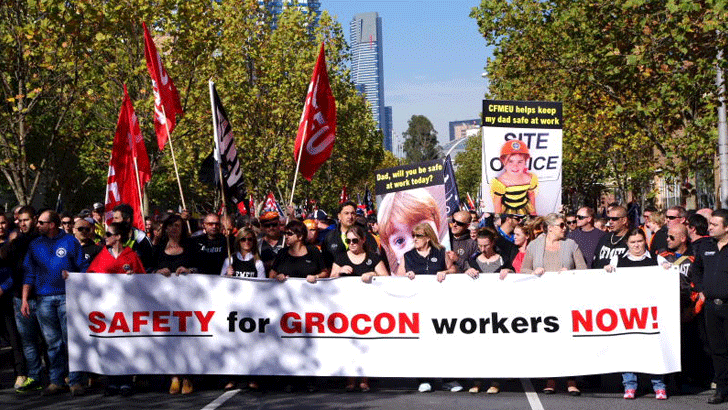Crime, class, and corruption in construction

There’s a class content to “crime”. Just look at the legal cases. A company that kills a construction worker through gross neglect of health and safety can plead guilty, like Perth construction company Cochrane and Sons in October last year, and pay a fine of just $65,000 while WorkSafe tut-tuts: “It’s really disappointing …”
But a union that stops production to protect workers’ rights will be fined millions and be hounded by media and politicians. In the 12 months ending in June 2011, the Victorian branch of the CFMEU alone was fined $2.5 million for taking “illegal” industrial action to defend members’ workplace rights. The union is being pursued for $10 million for the industrial dispute over health and safety reps on Daniel Grollo’s notoriously unsafe construction sites.
There’s a class content to “crime”. Just turn to the finance pages.
You’ll find reports from October of corruption on a scale that only a major multinational like Leighton Holdings can manage, with former employees documenting tens of millions of dollars flowing through slush funds from Melbourne to Monaco to Malaysia, the price of winning friends and business. But no campaign for a royal commission here.
Look a little further and you’ll find reports of hundreds of thousands of dollars sloshing around in hospitality and sponsorships between the Master Builders Association, individual builders and the Victorian Building Commission, which is meant to regulate the industry. Some headlines, but no witch-hunt in the media, no one stalked outside their homes.
Of course, with the best lawyers and accountants that money can buy, the corporates’ chances of getting off improve dramatically. When the Grollo family was prosecuted, accused of evading $26 million in tax in the 1990s, the family threw money at the best QCs and accountants in the country. They even paid people to sit in the courtroom to direct “positive mental energy” toward Bruno Grollo. Something worked: the charges were dropped half way through the trial. No criminals here, your honour, just a bottomless pit of money and a lot of positive mental energy.
But one disputed allegation by a repeat bankrupt about a union officials’ colourbond roof, almost a quarter of a century ago, and the government threatens to spend tens of millions on another anti-union royal commission. The only thing giving it pause for thought, according to the Financial Review, is the certain knowledge that any serious investigation would expose the bosses’ own corrupt practices on a far greater scale.
There’s a class content to “crime”. Take a look at the death notices.
Many of the worst crimes, which steal years of health, joy, love and life, don’t break any laws at all.
Frank Casula was a workmate of mine. I remember looking across the city from the new Crown Casino Hotel site in Southbank. I remarked that the crane jibs were up at Lend Lease: there must be a strike again. Frank pointed down at the ugly pile of concrete boxes at the end of Flinders Street known as the “World Trade Centre”, built in the early 1980s. In two years working on that site, Frank told me, he never took home a full pay packet – every week, he lost money for a strike. “But we win every strike. BLF then. Very strong.”
By the time I worked with Frank, he was getting on. He was a patcher, fixing the small (and not so small) defects in the concrete work that the rest of us had left as the building went up. Plenty of concrete dust in that job. Frank was never the quickest on his feet but he kept going all day, every day of the year, and took pride in the professional job he did.
From time to time, the bean counters who ran the company would do a restructure. They weren’t confident to take on the union by sacking the old-timers, but they would make life uncomfortable by shaking people out of their usual jobs. The last day I worked with Frank, he had been put on the deck with the rest of us, laying Bondek in the direct sun. We looked after each other as best we could, pacing ourselves and taking breaks to keep hydrated. But the strain told on him. That night, he had a stroke.
Frank survived, and eventually made it back to work, but he was never the same. When he died a couple of years later, one of my workmates shook his head and looked down. “Not even one day, the pension.” A memorial in the Italian language press from his family, and a notice in the Herald Sun paid by his former workmates, was all the public mourning that Frank got.
According to the bosses and their media, there’s no crime here, and no story. Move along, there’s nothing to see. Just another worker dead.
There’s a class content to “crime”. Just ask the workers on site.
In 12 years on site, the vast majority of my workmates – even the sad tea room grub who would sometimes read Andrew Bolt aloud, as if it was the Lord’s Prayer – had to acknowledge that an effective union is the only defence we have against being used up and chucked out, sacked on a whim and exploited without mercy.
This is precisely the “crime” that so offends the ruling class and its willing lackeys in the press. The idea that working class people can win good wages and strict safety, and exercise a degree of collective control over our working lives – according to our rulers, this is the worst crime of all.